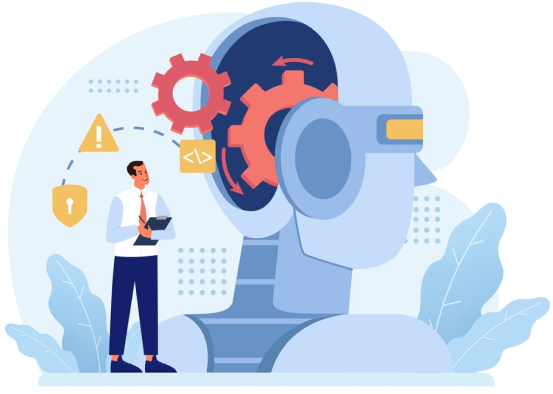Artificial Intelligence (AI) has become one of the most disruptive forces shaping the global business landscape, and the UAE is no exception. From financial services to healthcare, retail to real estate, AI chatbot development in the UAE is transforming how organizations engage with customers, automate processes, and scale operations.
As the UAE positions itself as a global leader in digital innovation—with initiatives like Dubai’s Smart City Vision and the UAE National Artificial Intelligence Strategy 2031—AI chatbot adoption has surged across industries. Businesses in the region are no longer asking if they should deploy chatbots, but rather how fast they can integrate them to stay competitive.
This guide provides a comprehensive overview of AI chatbot development in the UAE—covering benefits, use cases, key features, and the roadmap for building one.
Why AI Chatbot Development Matters in the UAE
The UAE is at the forefront of AI adoption. With a tech-savvy population, high smartphone penetration, and a thriving e-commerce ecosystem, customer expectations are at an all-time high. Consumers want instant responses, personalized interactions, and 24/7 support—something traditional customer service teams struggle to provide efficiently.
Here’s why AI chatbot development is crucial for UAE businesses:
- 24/7 Multilingual Support: With a diverse population speaking Arabic, English, Hindi, Urdu, and more, AI chatbots can seamlessly interact across languages.
- Scalable Customer Engagement: Businesses can handle thousands of customer queries simultaneously without expanding call center staff.
- Cost-Effective Operations: AI chatbots reduce dependency on large support teams, cutting operational costs significantly.
- Personalized Experiences: Advanced AI chatbots powered by machine learning (ML) and natural language processing (NLP) deliver personalized recommendations, boosting sales and customer loyalty.
- Smart City Alignment: Chatbots support the UAE’s Smart Government and Smart Dubai initiatives by improving accessibility and digital-first experiences
Key Industries in the UAE Using AI Chatbots
AI chatbot adoption in the UAE is not limited to a single industry. Here are the top sectors embracing chatbot development solutions:
- Banking & Finance
- Automating account inquiries, loan applications, and payment reminders.
- AI chatbots in UAE banks like Emirates NBD and Mashreq have enhanced customer service and digital banking.
- Healthcare
- Assisting patients with appointment scheduling, symptom checks, and insurance queries.
- AI chatbots help hospitals reduce wait times and improve patient engagement.
- Retail & E-Commerce
- Offering personalized shopping assistance, product recommendations, and real-time delivery updates.
- E-commerce giants in the UAE are increasingly integrating chatbots to boost sales conversions.
- Real Estate
- Providing property listings, scheduling viewings, and answering buyer questions.
- Real estate companies leverage chatbots for lead generation and faster sales cycles.
- Hospitality & Tourism
- UAE’s tourism sector benefits from AI chatbots assisting with bookings, itineraries, and multilingual support for international visitors.
Essential Features of an AI Chatbot for UAE Businesses
When developing an AI chatbot for the UAE market, it’s important to integrate features tailored to regional and business needs:
- Multilingual Capabilities (Arabic, English, Hindi, Urdu, etc.)
- Omnichannel Support (WhatsApp, websites, mobile apps, social media)
- AI-Powered NLP for natural, human-like conversations
- Personalization using customer data and behavioral analytics
- Secure Payments & Transactions for e-commerce and financial sectors
- Voice Assistants Integration (Arabic-speaking voice bots are on the rise)
- Smart Analytics Dashboard for monitoring customer interactions and chatbot performance
Steps to Develop an AI Chatbot in the UAE
Building a chatbot involves a structured approach. Here’s a simplified roadmap:
1. Define the Purpose
- Identify business goals: customer support, sales, lead generation, or internal automation.
2. Choose the Right Platform
- Decide where the chatbot will operate—website, WhatsApp, mobile app, or all.
3. Select AI & NLP Technology
- Use advanced AI frameworks like Google Dialogflow, Microsoft Bot Framework, or Rasa for custom development.
4. Design Conversational Flows
- Create user-friendly dialogue structures tailored to the UAE’s multilingual and multicultural audience.
5. Integrate APIs & Backend Systems
- Ensure seamless integration with CRM, ERP, or payment gateways.
6. Train & Test the Chatbot
- Use machine learning and real customer interactions to improve accuracy and responses.
7. Deploy & Monitor Performance
- Launch across chosen platforms and use analytics to track improvements.
Challenges in AI Chatbot Development in the UAE
While chatbot adoption is growing, businesses face challenges:
- Language Nuances: Arabic dialect variations make NLP development complex.
- Cultural Adaptability: Chatbots must respect cultural sensitivities in communication.
- Integration with Legacy Systems: Some industries still rely on outdated backend software.
- Customer Trust: Users must feel secure when sharing personal or financial data with chatbots.
The Future of AI Chatbot Development in the UAE
The UAE’s commitment to becoming an AI hub ensures that chatbot technology will only advance further. Upcoming trends include:
- Generative AI-powered chatbots for hyper-personalized conversations.
- Voice-first chatbots in Arabic for hands-free interactions.
- AI-driven predictive analytics for proactive customer engagement.
- Integration with IoT in smart homes, healthcare, and transportation.
By 2031, as per the UAE’s AI strategy, chatbots and virtual assistants will become an integral part of both public and private services.
Final Thoughts
AI chatbot development in the UAE is no longer a futuristic concept—it’s a business necessity. From streamlining customer support to driving sales, chatbots are enabling UAE enterprises to deliver seamless, multilingual, and intelligent customer experiences.


